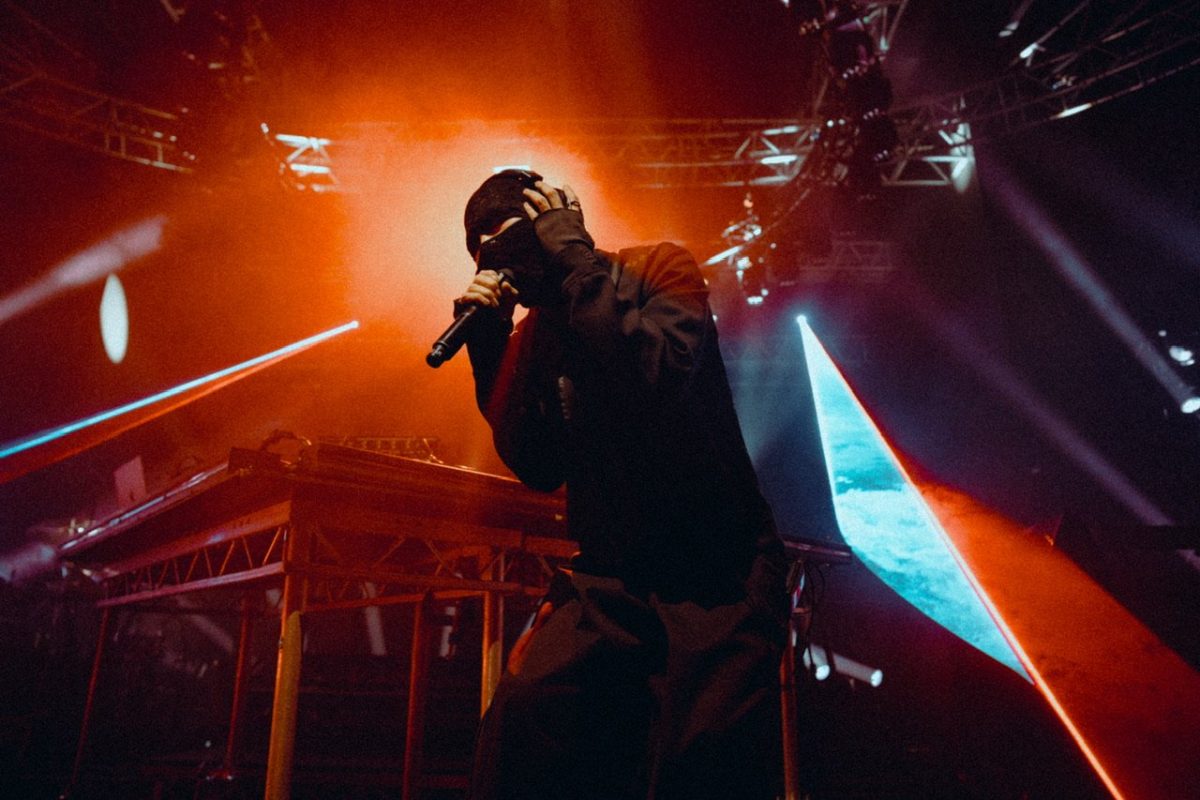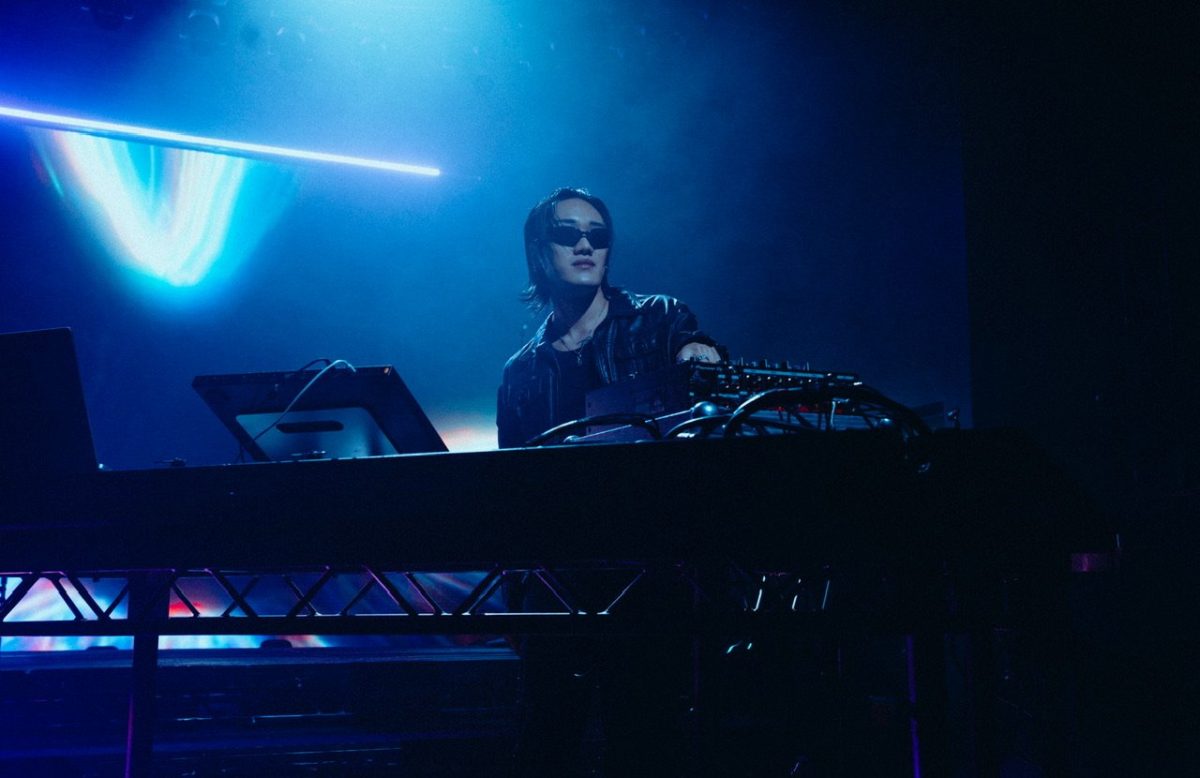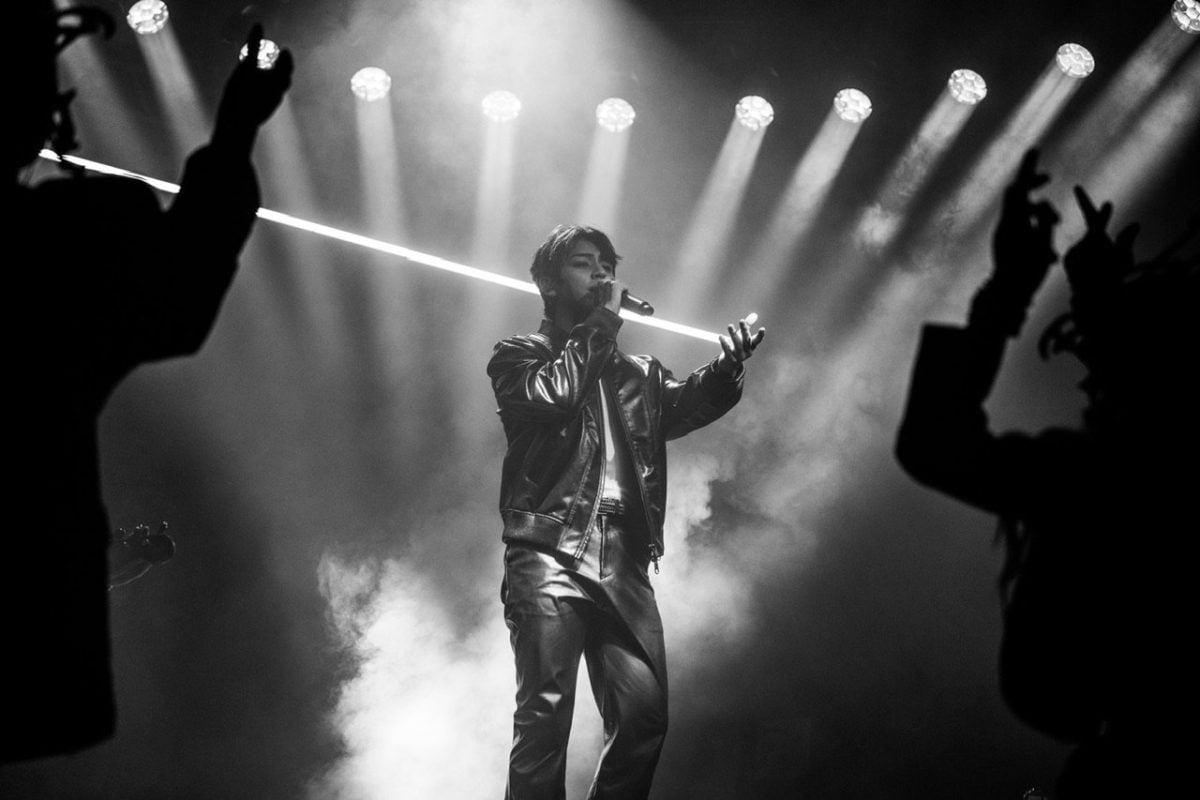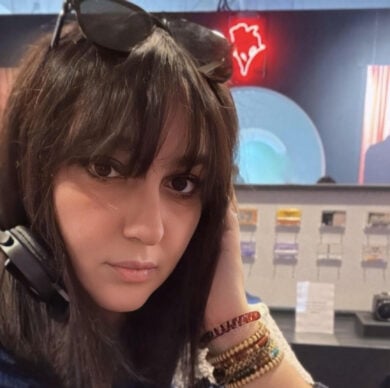DPR Ian, one of the most eclectic and captivating artists in contemporary music, reveals himself in a small backstage room at Milan’s Fabrique. After a Q&A session with fans, the charged atmosphere of excitement dissolves into a surreal intimacy: Ian sits on a worn-out couch, enveloped in a calm that starkly contrasts with the intensity he brings to the stage. There’s nothing contrived about his demeanor—only a natural elegance that makes him instantly approachable yet intriguingly enigmatic.
Christian Yu, better known as DPR Ian, is an artist who defies conventional definitions. Born in Australia, he has carved out a unique place in the South Korean music scene, emerging as a standout figure within the creative collective Dream Perfect Regime (DPR). A singer, director, producer, and visionary, Ian doesn’t just create music—he constructs entire worlds. His artistic universe is inhabited by characters that embody his inner conflicts and emotional complexity. There’s MiTo, the vulnerable, melancholic side, and Insanity, the incarnation of chaos, anger, and contradiction. Both come alive in his songs, videos, and performances, as if they are integral, living pieces of an inseparable whole.
During the interview, Ian doesn’t present himself as merely a successful musician but as a storyteller of universal emotions and experiences. Every response seems deliberate yet unforced as if each word is chosen with the precision of someone who understands that honesty is the key to truly connecting with others. Ian speaks with a sincerity that borders on poetic, and his words are thoughtful yet never artificial. The conversation unfolds with an effortless flow, weaving between intimate reflections and lighter moments. The atmosphere in the room shifts gradually: what begins as a standard Q&A transforms into a profound dialogue, almost like a meeting of souls. The divide between artist and interviewer dissolves, replaced by a shared sense of understanding and vision.
DPR Ian speaks about music as though it were a natural extension of his existence, a medium through which he explores and gives form to his emotions. Each word carries weight, but it’s never burdensome or pretentious. There is a perfect balance between the gravity of the themes he touches on and the ease with which he expresses them—a rare ability that defines him not just as an artist but as an extraordinary communicator.
Next to him on the couch, DPR Cream and DPR Arctic are part of the collective. Their presence fosters a sense of camaraderie and mutual support, cultivating an atmosphere that feels both familiar and genuine. The authentic bond that links them is palpable, adding to the moment’s significance.
The most extraordinary moment arrives at the end when Ian asks to learn a few words in Italian amidst laughter and a spontaneous hug. In that instant, the interview transcends its original purpose, becoming a uniquely human experience. The hug that concludes the meeting isn’t just a gesture of politeness but a tangible demonstration of a connection that goes beyond words.
DPR Ian is not just a well-rounded artist; he is a soul capable of transforming every encounter into an unforgettable moment and leaving behind a lasting impression. His music isn’t merely a soundtrack—it’s a visual, emotional, and intellectual narrative, an experience that surpasses the boundaries of listening alone.
Anyone who chooses to explore this world doesn’t just step into Ian’s mind but into an entire universe. A place where reality and imagination intertwine, leaving a mark that belongs to everyone who decides to immerse themselves in the art of DPR.
Here is our interview.
How does it feel to perform in Milan as part of The Dream Reborn tour?
IAN: “For me, it’s incredible. I came to Milan last year for a fashion show, and I didn’t even know we had fans here. When I found out, I promised myself I’d come back and do a show. I’m so happy. Italian fans are incredibly passionate, and I can feel all their energy.”
What does the DPR collective represent for you, both personally and artistically?
IAN: “DPR is deeply personal to me. It’s not just a collective—it’s a reason to live. It’s such an important, monumental part of my life that it defines who I am. It’s tied to everything: my family, my friends, and my purpose. It gives me direction and continuously shapes the person I want to become.”
Can you share a particularly powerful or surreal moment you’ve had on stage?
IAN: “Every city brings something unique. Fans react differently depending on the culture, and that makes every performance interesting. For instance, in Mexico, the crowd was massive, around 19-20,000 people, but even smaller shows have been just as intense. Some cities, like Warsaw, surprised me with the passion of the fans. In Milan, fans already seem very enthusiastic yet composed, and I can’t wait to see how they’ll let loose during the show.”
What is your creative process when building a narrative for your songs and performances?
IAN: “For me, everything starts with honesty. It has to be personal, or it just doesn’t work. The narrative I build always reflects what I’m experiencing at the moment or what I’ve been through in the past year. I believe the best way to tell an authentic story is to draw from personal experiences—only then can it feel real and meaningful. My creative process involves exposing myself to new experiences. I love watching musicals or shows like Cirque du Soleil because they offer visual and narrative stimuli I wouldn’t get if I stayed in my comfort zone. I’m always looking for something new to see, something to enrich my creative toolkit. It’s crucial for me not to recycle the same ideas. If I don’t continually add ‘new books’ to my creative library, I risk repeating myself, and that can block inspiration. I also try to live every experience with full awareness. I like to be completely present, absorb every detail, and take something meaningful from it. That’s where my stories come from.”
Many of your songs delve into complex emotions and introspection and touch on one of the most important topics in modern society: mental health. Is there a song that represents a personal turning point or revelation for you?
IAN: “Yes, I think one of the songs that marked a turning point for me was Seraph. The title itself refers to the Seraph, the highest rank in the angelic hierarchy, closest to God. It should symbolize immense power, but in the context of the song, I chose to tell a different story. In Seraph, I play a character who was once a Seraph—strong, divine, unshakable—but who has lost that power. I used the image of burning wings as a metaphor for that sense of falling, of losing the strength and abilities I once believed were unbreakable. For me, this song reflects a time when I felt completely disconnected from the strongest version of myself. However, I realized that going through that darkness was essential. You know what they say: you have to face the worst to truly appreciate your best. It was a significant turning point in my life and music. Writing Seraph was challenging but necessary because I wanted it to be honest and authentic.”
How do you stay connected to your artistic identity despite the pressures of touring, constantly traveling, and continuing to create new music?
IAN: “I won’t lie; I still struggle. I don’t think I’ve ever found a clear balance. There are days when Cream, Artic, and I are in sync, and others when we’re not. The rhythm of touring is incredibly hectic—you’re in a new city every two days on average, with a new audience and new energy to face. This creates constant stimulation, but at the same time, the traveling is hard to process or fully live in the moment. You almost never have time to adjust or process what you’re feeling. And that’s crucial for many people: having the time to ground themselves and understand their emotions. Trying to maintain a sense of stability with such an intense schedule is a huge challenge. Honestly, I don’t know how anyone manages it. If someone has an answer, please, let me know.”
Can you tell us about your recent social media blackout? How important is it, in your opinion, for an artist—or anyone—to disconnect?
IAN: “That’s a great and important question, thank you. In my life, I’ve always been clear about being open about what I go through as a human being, not just as an artist. This is important because we need to separate the idea that artists are not human. As time goes on, we see how people place idols on pedestals, but in doing so, it becomes strange to see someone being sick or sad. But artists are people, so it’s important that, while some people may want to build these fantasy images of who they idolize, we also normalize that these artists are human. By doing so, you create a healthy distinction: you admire their art, not their perfection. That’s the ground I want to build on, because in the end, you see the artist for what they are—someone who creates art—and that’s the definition of an artist: someone who challenges their reality and shares their art with others, whether you’re a fan or not.”
He pauses, smiling. Completely at ease, he continues to share his thoughts without pretense.
“For me, being vulnerable and open isn’t something I do because I want to, but because… why not? It would feel strange to me to only show my strength and not my weakness. But at the same time, if I were someone who only showed the dark side, I think it would promote an unhealthy way of addressing mental health. You have to show what you’re dealing with and how you’re fighting it. Because in that way, if I fight and show I’m getting better—if I’m winning—it means anyone else can do the same. That’s why I open up, because it’s also a new challenge for me. If I announce my ideas to the world, like my ‘five-minute rule,’ which means you’re only allowed to stay in your head for five minutes—no longer—and then you move on, I have to live by that, or I’d be a hypocrite. And I don’t like being one. So I deliberately force myself to expose a certain part of myself, then step back to show how I process it. For example, when I deactivated my Instagram, I knew I was overstimulated or getting manic. It’s something you see all the time: celebrities going through an episode and speaking out before they’ve healed, which only makes things worse.”
He leans forward, looking at us.
“They call it the ‘devil’s tongue,’ right?”
I nod.
“When it happens to me, I disconnect from everything until I’ve healed. Then I come back. It’s something I’ve learned over time. I’ve made mistakes in the past, like going live when I wasn’t in the right place, but now I know you can choose what you share with people. You don’t have to show your most damaged side all the time. Some things should stay private, for your own care. So when I feel an episode coming, I step back. Especially during a tour, I can’t afford to compromise anything. I’m here to do a job, and I don’t want that to become an issue. Now that I’m older, I understand that social opinions don’t really matter much, even if they can be harsh. But that’s reality. I’m sure you, as a journalist, know what I mean.”
I smile, nodding again with a sigh.
He laughs, and we exchange stories for a moment before resuming.
If you had to describe your music to someone who has never heard it before, how would you define it?
IAN: “For me, it’s a dream state. A fever dream. Actually, ‘A Midnight Summer Fever Dream.’”
Earlier, you mentioned that DPR is like a family. Can you share a story that captures the bond you share with the team?
IAN: “Yes, we’ve been through possibly one of the hardest things a team could go through in the last two years. We’ve lost a significant amount—not just people. We went through a process that could have destroyed us. And honestly, if we weren’t close or didn’t truly care about each other, we wouldn’t still be here. Of course, we’d be alive, but we wouldn’t be together like this. After everything that happened a year or two ago, the fact that we’re here now, doing a world tour, visiting countries we’ve never been to before, is a testament to how much we care for one another. Because if we weren’t family, if we didn’t care, I don’t think we could have endured.”
If you had to describe yourself in one word, without thinking too much, what would it be?
IAN: “Honest.”
Last question: Can you give your fans an idea of what they can expect from you in the future?
IAN: “For me, personally, the next chapter in the series will feature a new character. So far, I’ve introduced Mito, Insanity, and others, but the character who, ironically, hasn’t emerged yet, even though he should have, is Ian. It’s funny, since my name is Ian, but it took Mito, Insanity, and everything else to reach a point where Ian could finally come out. That’s the next step for me: Ian.”
In Conversation with: DPR Cream

Before joining DPR, he seriously considered quitting music. No one was interested in him or his work, deeply affecting his self-esteem. However, everything changed when he joined the Dream Perfect Regime (DPR) in 2015, shortly after the release of Till I Die. DPR provided him with a collaborative and inspiring environment that reignited his passion for music.
Kim Kyung-mo, known as DPR Cream, is a multifaceted artist: producer, composer, and singer. He made his solo debut on July 5, 2019, with the digital single The Voyager 737, a milestone he hadn’t initially planned for. His primary focus was composing and producing music, but his tracks resonated so strongly with the DPR team that they encouraged him to debut as a singer.
Cream’s musical journey began with vocal training: he majored in vocals and has been singing since his early twenties. However, a pivotal moment in his career came during a session when someone suggested he try composing. This sparked his transition to music production, where he excelled by mastering the piano and experimenting with innovative sounds.
One of Cream’s signature techniques is the “zero gravity state,” a sound design method he created himself. It transitions from a strong, dynamic sound to a quieter, minimal tone, often used to add contrast and depth to his tracks. Among his inspirations are artists like Prince, and he values music for its emotional resonance, even without understanding the lyrics, citing Frank Ocean as an example.
With tattoos that reflect his artistic identity and a dedication to pushing creative boundaries, DPR Cream has become an essential part of DPR’s sound and vision. His journey from a self-doubting musician to an accomplished artist showcases the transformative power of collaboration and perseverance.
How does it feel to be performing in Milan as part of the Dream Reborn tour?
CREAM: “This is my first time in Milan, and I was curious about how it would feel to perform here. Walking around the city, I saw how beautiful it is, and now I’m even more excited to see the fans and how they’ll react to the show.”
As one of the visionary artists in DPR, what does the DPR collective mean to you personally?
CREAM: “Family. To me, it feels like family. Anything I want to do as an artist, I know that I’m going to get the support of them. I know that there are people around me who would be willing to help, be behind me and do the art that I want.”
Can you tell us about a particular stage moment that felt surreal or particularly powerful for you?
CREAM: “This is my first tour, so every time I hear fans singing along to my songs, it feels surreal. In every venue, I’ve had these moments where I think, ‘Wow, this is really happening.’ As the tour progresses, the crowds get bigger, and their energy makes me feel proud and grateful.”
What are some of the biggest influences that shape your music, both within and outside the DPR?
CREAM: “Frank Ocean. But I love every kind of music. Nowadays I’m really into dancing music, house music, techno, everything feels always so different.Because of Artic, we are working together many times lately so I’m discovering more and more. And what I love the most is mixing. So I can say inside the DPR I’m very influenced by him (DPR Artic).”
How would you define your music if you had to describe it to someone who has never heard it?
CREAM: “The growing pain of evolving.”
The team starts laughing, and Ian comments, “basically, puberty”. Everyone laughs while Cream – laughing hidden by his cap – shakes his head.
Earlier, you mentioned that DPR is like a family. Can you share a story that captures your bond with the team?
CREAM: “There’s a Korean saying that says: after a harsh rainfall, the ground dries and becomes stronger, more solid. (The Korean proverb he’s referring to is “비 온 뒤에 땅이 굳어진다” (bi on dwie ttang-i gudojinda), which translates to “After the rain, the ground hardens”) That perfectly reflects our journey as DPR. We’ve been through heavy rains, as Ian mentioned, moments that tested us deeply. But those challenges only brought us closer. The bond we share now is tighter than ever, built on the strength we gained from overcoming those hardships together. We’ve also welcomed new team members who have added to this solidity, making us an even stronger and more united collective. It’s like the ground beneath us is more solid than it’s ever been.”
What would it be if you had to describe yourself in one word without overthinking?
CREAM: “Savage.”
Last question: Can you give your fans an idea of what they can expect from you in the future?
CREAM: “I’m working on my next album, but it’s going to be more of a mixtape. And Artic and I we are working on something together, I hope we can create a compilation.”
In Conversation with: DPR Artic

When he appeared on stage, the crowd, from silent anticipation, erupted in a roar. Artic made Milan dance like no one had in years.
Kim Yongwoo, known as DPR ARTIC, is an independent techno DJ and producer who officially debuted with the DPR collective on February 2, 2024, with his EP “KINEMA.” Although he was officially announced as a member on December 22, 2023, Artic has been a part of DPR since 2019, where he worked as a producer and DJ, accompanying the group in their performances.
His career with DPR began in 2019 when he first performed at the Head In The Clouds Music Festival in Los Angeles. Since then, Artic has made his mark as a producer of memorable tracks like “Set It Off” feat. DPR CLINE and “SYNC,” collaborating with DPR Cream on productions for showcases 001, 002, and 003. In 2023, he took the stage at the Regime Tour Finale in Seoul, once again alongside Cream.
In addition to his work with DPR, Artic continues to produce and perform as an independent artist under the same name, adopted in 2018 shortly before joining the collective. His music is distinguished by its hypnotic energy and engaging sounds, capable of transforming any stage into a never-ending party.
With the debut of his EP “KINEMA,” DPR ARTIC not only proves to be an essential member of the collective but also an independent force in the global techno music scene. His talent, both as a producer and DJ, promises to take him even higher as he continues to make crowds dance all over the world.
How does it feel to be performing in Milan as part of the Dream Reborn tour?
ARTIC: “It’s my first time in Italy, and I have to say, it feels truly surreal. I can’t believe I’m here, let alone here to do a show. I feel incredibly excited, happy, and full of emotion.”
As one of the visionary artists of DPR, what does the DPR collective mean to you personally?
ARTIC: “For me, DPR represents a huge part of my life. It’s much more than just a collective; it’s a fundamental part of the reality I’m living right now. It holds deep meaning and occupies an essential space in both my personal and artistic journey.”
Can you tell us about a specific moment from the tour that felt surreal or particularly powerful?
ARTIC: “I think every city has something unique. Fans react in very different ways, and I don’t believe there’s a better or worse reaction in general. Each city has its own way of showing passion, and it’s always been interesting to notice these differences.”
What are some of the biggest challenges in merging your personal sound with the overall vision of DPR?
ARTIC: “Honestly, there haven’t been any big difficulties. We’ve been together for a long time, not just in music but in life. Because of this bond and mutual understanding, it was easy for me to integrate their sound and ideology, whether it was Ian’s or the broader DPR vision, into my artistic journey. It was all very natural to merge my sound with DPR’s overall vision.”
How would you describe yourself if you had to use just one word?
ARTIC: “Rough.”
Last question: Can you give your fans an idea of what they can expect from you in the future?
ARTIC: “I want my fans to know that I’m working hard to grow and improve more and more, pushing myself beyond the limits I have now.”

